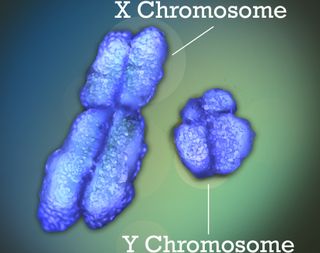'Guevedoces': Rare Medical Condition Hides Child's Sex Until Age 12

Some children with a rare genetic condition appear female at birth but later develop a penis and testes around the time puberty begins. But what causes this to happen?
A new article in BBC Magazine tells the story of some children in the Dominican Republic with this condition, who are known in the country as Guevedoces, which roughly translates to "penis at 12." One child named Johnny was raised as a girl, but when he matured and neared puberty, he grew a penis and his testicles descended, according to the BBC.
Children with the condition are genetically male, meaning they have one X and one Y chromosome. However, as they develop in the womb, a genetic mutation prevents their bodies from converting the male hormone testosterone into a hormone called dihydrotestosterone, or DHT. Because DHT is responsible for the development of male sex organs, the lack of DHT means the male organs don't develop properly, according to the National Institutes of Health.
When children with the condition are born, their external genitals look female, or in some cases, appear ambiguous, the NIH says. But during puberty, Guevedoces, like typical males, experience an increase in testosterone. The body appears to respond to these higher levels of testosterone — the penis and scrotum grow larger, and secondary sex characteristics — such as increased muscle mass and a deep voice — can also appear.
Men with this condition, officially called 5-alpha reductase deficiency, are usually infertile, and often do not develop much facial or body hair. Although most children with this condition are raised as girls, about half identify themselves as male after puberty, the NIH says. [7 Diseases You Can Learn About From a Genetic Test]
Johnny told the BBC that he never felt comfortable doing "girl things."
"I never liked to dress as a girl, and when they bought me toys for girls, I never bothered playing with them — when I saw a group of boys, I would stop to play ball with them," Johnny told the BBC.
Sign up for the Live Science daily newsletter now
Get the world’s most fascinating discoveries delivered straight to your inbox.
(People with 5-alpha reductase deficiency who were raised female but identify as male are not transgender, because in this case, they identify with their biological sex. People who are transgender identify with a gender that is different from their biological sex.)
In addition to the Dominican Republic, cases of 5-alpha reductase deficiency have been found in Papua New Guinea, Turkey and Egypt, according to the NIH.
Follow Rachael Rettner @RachaelRettner. Follow Live Science @livescience, Facebook & Google+. Original article on Live Science.

Rachael is a Live Science contributor, and was a former channel editor and senior writer for Live Science between 2010 and 2022. She has a master's degree in journalism from New York University's Science, Health and Environmental Reporting Program. She also holds a B.S. in molecular biology and an M.S. in biology from the University of California, San Diego. Her work has appeared in Scienceline, The Washington Post and Scientific American.
Most Popular



